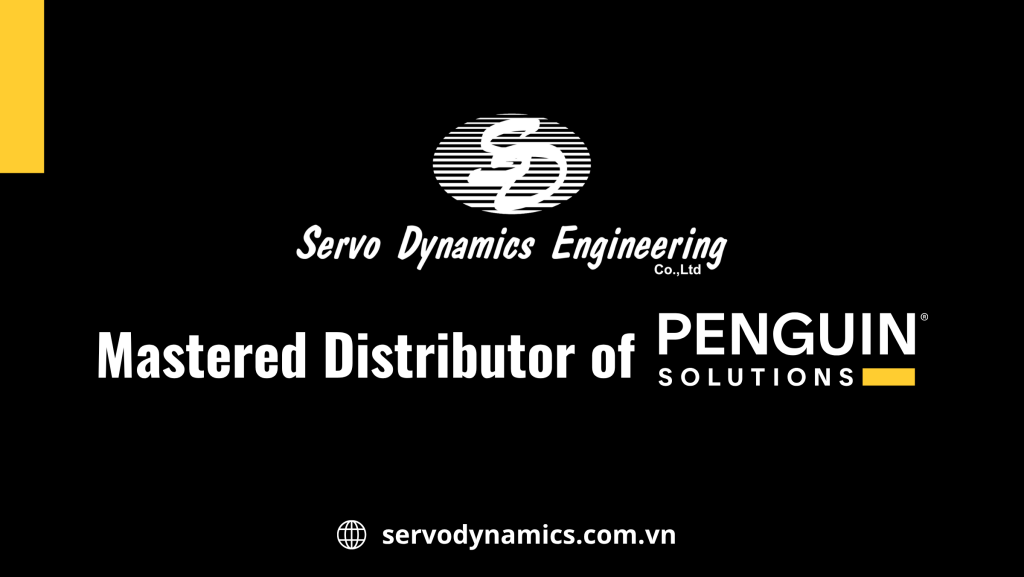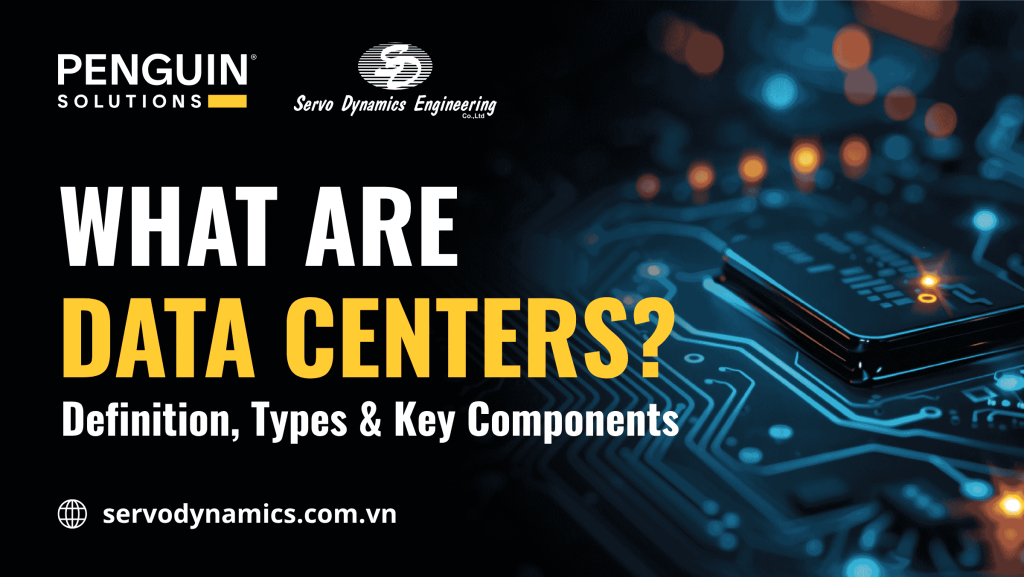Consulting, Solutions
What is a Data Center? Definition, Classification, and Detailed Structure
Data Center is the core asset and the “brain” of every organization in the digital era. It is not merely a room full of servers, but a complex physical and technological infrastructure system, designed to store, process, and distribute all digital data.
This article will delve into the definition, detailed structure, common types of Data Centers, and the important standards that help Data Centers operate stably 24/7.
What is a Data Center?
Definition of Data Center
A Data Center is a specialized infrastructure facility that concentrates thousands, even millions, of computing, storage, and networking devices. It is built to provide an ideal operating environment—in terms of power, cooling, and security—for servers and other critical IT equipment.
This is where every application, website, online service, and cloud data is operated and protected.
Role of Data Centers in the Digital Age
Data Centers play an indispensable role, ensuring continuous operation and security for the digital world:
- Centralized Data Storage: Provides the physical space and technology to store vast amounts of corporate data, from customer records, financial transactions, to AI/ML data.
- Supporting IT System Operations: Serves as the foundation for all business applications, email, ERP/CRM systems, and cloud services.
- Ensuring Availability: With complex redundancy systems, Data Centers commit to extremely high uptime, ensuring services are never interrupted.
- Security & Information Safety: Implements strict physical and network security measures to protect sensitive data from unauthorized access and threats.
What are Data Centers used for? (Practical Applications)
Data Centers are the backbone for many activities we use daily, including:
- Cloud Computing: Providing IaaS, PaaS, and SaaS services.
- E-commerce Transactions: Ensuring speed and security for online transactions.
- Artificial Intelligence (AI) and Machine Learning (ML): Hosting high-performance GPU/AI server clusters to process deep learning models.
- Content Streaming: Storing and distributing video and music content.
Examples of Popular Data Centers (Google, AWS, Viettel IDC…)
Large Data Centers worldwide belong to leading Cloud Service Providers (CSPs) and technology companies:
- Google Cloud Data Centers: A massive global distributed network, supporting services like Google Search, Gmail, and YouTube.
- Amazon Web Services (AWS) Data Centers: Leading the Cloud market, providing services to millions of businesses.
- Viettel IDC, FPT Telecom, VNPT: Leading Data Center providers in Vietnam, serving the domestic and regional markets.
What Constitutes a Data Center? (Data Center Architecture)
A modern Data Center structure is a combination of three core components (Compute, Storage, Network) and a comprehensive supporting infrastructure system.
1. Power Infrastructure
Ensuring continuous power supply is the top priority.
- UPS (Uninterruptible Power Supplies): Provides instantaneous power during an outage, allowing the system to transition to backup power without interruption.
- Backup Generators: A secondary power source, usually diesel-powered, maintaining Data Center operation during long-term grid power loss.
- Power Distribution System (PDU, RPP, Switchgear): Manages, distributes, and controls the electrical current to each rack and IT device.
2. Cooling System
Servers generate a large amount of heat. The cooling system must maintain optimal temperatures to prevent equipment damage and ensure performance.
- CRAC / CRAH (Computer Room Air Conditioner / Handler): Main devices that regulate air conditioning in the server room.
- Chiller, AHU (Air Handling Unit): Provides chilled water and processes air for large cooling systems.
- Liquid cooling (Direct-to-chip / Immersion cooling): An advanced cooling trend, using liquid in direct contact with chips (for AI/HPC) or immersing the entire server in non-conductive fluid, significantly saving energy.
3. Network & Connectivity System (Network Infrastructure)
These are the devices that allow servers to communicate with each other and the outside world.
- Router / Switch: Switching and routing devices that manage internal data traffic and connect to the Internet network.
- Fiber backbone: High-speed fiber optic network, providing large bandwidth for the Data Center’s backbone.
- Interconnect (IX, Peering): Network interconnection point, allowing the Data Center to connect directly with other large networks and service providers.
4. Servers & IT Equipment (IT Equipment)
Devices responsible for processing and storing data.
- Server: Physical or virtualized servers, where applications and workloads run.
- Storage: Data storage systems, including SAN, NAS, and Software-Defined Storage.
- GPU/AI server: Servers equipped with specialized Graphical Processing Units (GPU) for Artificial Intelligence (AI) and High-Performance Computing (HPC) tasks.
5. Security & Safety
Physical protection against external threats.
- Access Control: Multi-layered authentication systems (proximity cards, biometrics) only allow authorized personnel into the server area.
- CCTV Surveillance: 24/7 monitoring of the entire Data Center area.
- Fire Suppression System FM200 / Novec 1230: Uses clean extinguishing gas (harmless to IT equipment and the environment) to immediately suppress fires.
6. Physical Infrastructure
Architectural elements supporting the Data Center.
- Rack & Cabinet: Metal frames for installing servers, switches, and IT equipment.
- Raised floor: Raised flooring, creating space underneath for power cables, network cables, and cold air circulation.
- Cold aisle / Hot aisle containment: A method of separating cold air flow (used for cooling) and hot air flow (exhausted from servers) to optimize cooling efficiency and reduce power consumption.
7. Monitoring & Management System
- DCIM (Data Center Infrastructure Management): Software for managing Data Center infrastructure, integrating monitoring of power, cooling, space, and IT equipment.
- Monitoring Power / Cooling / Security: Real-time monitoring of critical metrics such as temperature, humidity, power consumption, and security status.
Common Types of Data Centers Today
Depending on the scale, intended use, and operating model, Data Centers are classified into several types:
1. Enterprise Data Center
Owned and operated by a single organization, serving solely the internal needs of that organization (e.g., a large bank or technology corporation building its own Data Center).
2. Colocation Data Center
A “leasing” model. Customers rent rack space (cabinet), power, and cooling from a third-party provider, but retain ownership and management of their servers.
3. Cloud Data Center
Large-scale, distributed, and highly virtualized Data Centers, providing computing, storage, and network resources over the internet as a service (IaaS, PaaS, SaaS). They are owned by large Cloud Service Providers (CSPs).
4. Hyperscale Data Center
Extremely large-scale Data Centers (usually 5,000 servers or more) built and optimized to serve Cloud providers and large tech companies, emphasizing rapid scalability and cost efficiency.
5. Edge Data Center
Smaller Data Centers, located closer to the user or the data source (network edge). They help reduce latency for applications requiring fast responses such as 5G, IoT, and autonomous vehicles.
6. Modular / Micro Data Center
Prefabricated Data Center solutions, packaged in containers or small, compact racks. They are easily deployed quickly in any location and are ideal for Edge or temporary needs.
7. Green Data Center (Environmentally Friendly Data Center)
Focuses on sustainability and minimizing environmental impact.
- Low PUE: Achieves a low Power Usage Effectiveness (PUE) index, demonstrating the ability to use power efficiently for IT equipment.
- Renewable energy: Uses renewable energy sources (such as solar or wind power) to power Data Center operations.
Data Center Standards and Tiers (Tier 1 – Tier 4)
International standards help evaluate the reliability, availability, and performance of Data Centers.
What is the TIA 942 Standard?
TIA-942 is a standard from the Telecommunications Industry Association (TIA), focusing on the design of telecommunications and physical infrastructure of Data Centers, including cabling systems, network architecture, power, and cooling.
Tier Classification by Uptime Institute
The Uptime Institute classifies Data Centers into four levels (Tiers) based on redundancy and maintainability:
| Tier Level | Name | Committed Uptime (Maximum Downtime/Year) | Redundancy Mechanism |
|---|---|---|---|
| Tier I | Basic Capacity | 99.671% (28.8 hours) | Non-redundant (N) |
| Tier II | Redundant Components | 99.741% (22.0 hours) | Basic power and cooling redundancy (N+1) |
| Tier III | Concurrently Maintainable | 99.982% (1.6 hours) | Simultaneous maintenance (N+1) |
| Tier IV | Fault-Tolerant | 99.995% (26.3 minutes) | Fault-Tolerant (2N or 2N+1) |
Comparing Tier 3 and Tier 4
- Tier III: Allows maintenance of any component (power, cooling) without disrupting server operation (Concurrent Maintainable). Has at least N+1 redundancy.
- Tier IV: Fault-Tolerant. Not only has N+1 but also has two independent redundancy systems (2N or 2N+1). Any single point of failure is not allowed to disrupt the system. Tier IV provides the highest level of availability (99.995%).
Data Center Operating Principles
The Power – Heat – Network Cycle
- Power: Utility grid power enters (then secured by UPS and Backup Generators). Power is distributed to the rack via PDU.
- Heat: Servers use power to process data and generate heat. The cooling system (CRAC/Chiller) removes this heat, typically by circulating cold air through the raised floor or using liquid solutions.
- Network: Data is processed by the servers, then transmitted through the fiber optic system, switches, and routers to the end user.
How Data Centers Ensure 99.999% Uptime
Tier III and Tier IV Data Centers achieve high uptime by eliminating every Single Point of Failure. Every critical component—from power lines, cooling units, to network cables—must have independent alternate paths and redundancy.
Redundancy Mechanisms N+1, 2N, 2N+1
- N: The minimum necessary Capacity required for operation.
- N+1: There is one extra redundancy unit compared to the minimum requirement. If one unit fails, the backup unit activates.
- 2N (or N+N): There are two independent systems, each meeting the full capacity need (N). If one system fails, the other system handles the entire load.
- 2N+1: Even higher than 2N, providing two independent systems plus one extra redundancy unit. This is the highest level of redundancy, commonly found in Tier IV.
Data Center Development Trends Globally and in Vietnam
The Data Center market is witnessing strong changes, driven by the demand for High-Performance Computing (HPC) and Artificial Intelligence (AI).
The Boom of AI Data Centers (GPU Cluster)
AI Data Centers are specialized facilities designed to house GPU server clusters. They require much higher Power Density and Liquid Cooling solutions compared to traditional Data Centers. Partners like Penguin Solutions are leading the way in designing and deploying optimal Data Center solutions for the modern AI and HPC era.
Hyperscale Data Center Growth
Large corporations continue to build Hyperscale Data Centers to expand global Cloud services, requiring flexible network architecture and high automation capabilities.
Green & Sustainable Data Center Trend
Environmental factors are increasingly important. Data Centers are transitioning to using renewable energy, optimizing cooling systems to reduce PUE, and recycling waste heat.
Data Center Construction Trends in Vietnam
Vietnam is becoming an attractive destination for Data Center construction due to its favorable geographical location and rapid digital transformation pace. The demand for Cloud, AI, and Edge Computing services is driving domestic and foreign investors to expand infrastructure.
Data Center in Vietnam – Current Status & Potential
Telecommunications Infrastructure & Advantages in Vietnam
Vietnam benefits from strongly invested telecommunications infrastructure, especially fiber optics and soon 5G networks. The central regional location helps Vietnam become an ideal connectivity Hub, opening up great opportunities for the Data Center market.
Market Opportunities with Strong AI and Cloud Growth
The explosive growth of AI and Cloud in Vietnam creates enormous demand for high-capacity Data Center solutions, especially HPC and AI server solutions, where Penguin Solutions provides advanced offerings.
FAQs – Frequently Asked Questions about Data Centers
What is the difference between a Data Center and the Cloud?
- Data Center: Is the physical facility (physical hardware) where servers, networks, and storage are located.
- Cloud: Is the service (software and virtualization) provided over the internet, running on physical Data Centers. The Cloud is how you consume Data Center resources.
What is a Hyperscale Data Center?
It is the largest scale of Data Center, designed for rapid scalability, cost efficiency, and is typically owned by Cloud Providers like Google, AWS, and Microsoft.
What is PUE in a Data Center?
PUE (Power Usage Effectiveness) is an index that evaluates the energy efficiency of a Data Center.
The formula for calculating PUE is: PUE = (Total energy consumed by the Data Center) / (Energy consumed by IT equipment)
The ideal PUE is 1.0 (all power is used for IT), the closer PUE is to 1.0, the more efficient the Data Center is.
What conditions are required for a Data Center to operate?
For stable operation, a Data Center requires:
- Continuous power supply (UPS, Generator).
- Effective cooling system (to maintain optimal temperature).
- High-speed and redundant network system.
- Strict physical and network security.
Penguin Solutions: Data Center Solutions for the AI and HPC Workloads
With years of experience, Penguin Solutions deeply understands the challenges of implementing a Data Center strategy in an era of increasing modern computing workloads like AI (Artificial Intelligence) and HPC (High-Performance Computing).
Penguin Solutions has been designing and deploying Data Center solutions since its inception, bringing deep consultative design experience to every project. We offer comprehensive, flexible options to meet your specific needs.
From a single rack to infrastructure spanning multiple Data Centers and closer to the edge, Penguin Solutions‘ experienced architects and engineers will work closely with you to design and implement your next Data Center solution.
Data Center Infrastructure Services Penguin Solutions Offers:
- Design Consulting: Leverage Penguin Solutions‘ deep technology infrastructure experience to design the ideal Data Center, hosted, or hybrid experience.
- Hosted Solution: Penguin Solutions provides a wide variety of validated co-location hosting options with world-class Data Center environments.
- Fully Managed Solution: Combine Penguin Solutions‘ hosting and managed services for a complete “as-a-service” fully managed solution.
Challenges & Solutions: When Your Needs Exceed Your Data Center Infrastructure Limits
Data Center Challenges
Whether planning and implementing in-house Data Centers to adopt new technologies, expanding to co-location facilities, or simply growing an organization’s geographic footprint, understanding current and future requirements, limitations, and costs is vitally important.
Data Center Solutions
Whether you are looking to deploy to your own Data Center, incorporate a hosted environment into your planning, grow your geographic/edge footprint, or recreate the cloud experience with fully managed, private Infrastructure-as-a-Service, Penguin Solutions is your trusted partner.
Penguin Solutions: Keeping the Digital Future “Always On”
Penguin Solutions, formerly known as Stratus, is a leading company in high-availability and fault-tolerant computing solutions. With over 40 years of experience, Stratus (now Penguin Solutions) has helped businesses—from Fortune 500 companies to small and mid-sized enterprises—keep their critical applications running smoothly without any interruptions.
Their standout products, like Stratus ztC Edge™ and Stratus ztC Endurance™, are designed to be simple to use, protected, and automated. These solutions are ideal for edge locations—where IT resources are often limited—as well as for data centers. They are especially valuable in industries that require maximum reliability, such as oil and gas, manufacturing, healthcare, finance, public safety, and more.
The name change from Stratus to Penguin Solutions reflects the company’s broader product portfolio and its mission to solve the most complex AI computing challenges, from data center to edge to cloud. Penguin Solutions is committed to delivering powerful technologies that turn data into actionable insights and ensure your business stays “Always On.”

Servo Dynamics Engineering: Master Distributor of Penguin Solutions in Vietnam
Penguin Solutions (formerly Stratus) is a world leader with over 40 years of experience in providing highly available (Always On) and fault-tolerant computing solutions, especially for complex AI/HPC workloads.
In Vietnam, Servo Dynamics Engineering proudly serves as the official distributor of Penguin Solutions. We commit to delivering:
- Comprehensive Solutions: Consulting on design and deployment of Data Center solutions (On-premise, Colocation, Hybrid) optimized for AI, Edge, and HPC needs of businesses.
- Absolute Reliability: Providing products like Stratus ztC Edge™ and ztC Endurance™, ensuring your critical applications always operate continuously.
- Expertise: A team of highly experienced technicians, ready to accompany customers from planning to operation. Servo Dynamics Engineering is a reliable partner, helping Vietnamese businesses convert data into action and ensuring business operations are “always on” in the digital age.

 Tiếng Việt
Tiếng Việt



